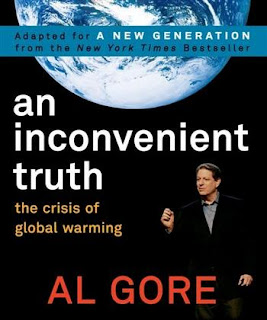
The part of me that grew up reading National Geographic applauds all green initiatives as well-meaning; the practical libertarian in me turns a skeptical eye towards large scale government initiatives that seek to legislate greenness. CAFE standards, "cash for clunkers" programs, requiring LEED certification, setting up complicated cap and trade programs: these all assume a level of precision of understanding how human behavior will play out that simply can't be had, and they all have unintended consequences and can be gamed.
Perhaps where I would place my effort is equally susceptible to these errors, but I'll venture my alternative anyway. As urban economist Edwin Mills would say, "Get the price right." Gas is artificially low because it doesn't account for tons of negative externalities. Our water bills don't properly account for each lot's contribution to stormwater runoff. We throw away trash with no regard to the additional cost of each bag on our municipal landfills.
Of course, I have just recommended three politically unpopular countermeasures. Not surprisingly, people aren't clamoring for these solutions. And so we will live with the consequences of convoluted, counter-productive, easily gamed top-down solutions, instead of somewhat more easily implemented alternatives that lead to behavioral changes in response to more proper price signals.
Again I ask: would you prefer politically untenable but rational and effective solutions, or crazily designed ideas that have the appearance of taking serious actions but which simply compound our challenges. I know which one I would choose, but I also know which one is leaving the train station. Which is a shame: one need not even crack open Al Gore's book to know, just by reading the front cover, that in order to do right by the planet, one needs to accept some "inconvenient" realities.
PS As a very long post-script to this post, let me also note that doomsday scenarios from the past have failed to come to fruition thanks to the remarkable ingenuity of humans to do more with less. Looking ahead, I am encouraged that we will continue to innovate our way to game-changing solutions to seemingly intractable problems like how to feed billions of people, how to make the most of scarce natural resources, and how to minimize any catastrophic impacts associated with global warning. However, I am discouraged if business is beat up so much around the world - vilified by reactionary citizenries and hamstrung by equally reactionary governments - that they are insufficiently motivated, capitalized, and encouraged towards the innovations that our livelihoods and our lives will depend on. So which will it be? Stay tuned.


6 comments:
"Practical libertarian", eh? I joined the anarcho-capitalist ranks a little over 2 months ago, myself. (You can see some details about that on a few posts on spreadword.blogspot.com, from April 2009 on.)
Thanks for putting the "unpopular" stuff out there! Faith as small as a mustard seed, can move a mountain.
Well, you've got my vote.
One thing I would like to do is follow your example and write regularly to my elected officials. People who theoretically care about/need my vote.
Joel, thanks. And thanks for letting me know that you're up and blogging again. "Anarcho-capitalist," eh? Would you allow for a role for a government on the two related notions that 1) tons of positive and negative externalities exist in the real world, and government is a good clearinghouse for adjusting for them, and 2) because of transaction costs and the free-rider problem, government is actually a relatively efficient way of dispensing of certain services (for example, national security is something that is expensive for individuals to secure for themselves, and no private entity would take it on for us unless everyone was covered).
Nicholas, thanks for your comment. Yes, we've become desensitized to the power we hold over our elected officials - after all, we elected them! - that we forget that we are still accountable to voting in an informed way, staying informed, and, as needed, informing our elected officials. Have fun writing!
Lee- For the purposes of answering your question, I consider your two "notions" as more than related, but as actually stemming from a single concern, which I can't help but think arises from a misunderstanding of what anarcho-capitalism actually is. (I actually prefer the term "voluntaryism", and will use it going forward. "Libertarian anarchism" is also valid.)
Anyway, I think that the confusion arises from the fact that voluntaryists are "hung up" on the systematic, continuous, and utterly unavoidable violation of the most basic human rights of individuals, by any State entity. (I'll leave a precise definition of "State entity" off of this comment.) These rights being, sovereign control of one's own "self" and one's "property". (Again, not defining those terms here.) To put it another way, we believe that all dealings between people (*and groups of people*) should be governed by contracts voluntarily (i.e. without the threat of force) entered into by each party to the contract.
So, national defense is no problem at all. Companies (comprised of, and contracted with, individuals and other companies) will cooperate to achieve defense of geographic regions, just as they do now. And I won't make this longer by saying why, but the "free rider" problem is not nearly as big a problem as "statists" (aka non-anarchists) like to think it is.
To be continued, I hope. If I write some blogs about Christianity and voluntaryism, I hope you might find the time to read them. I won't duplicate the main voluntaryist creed and its many ramifications, because it is easily accessible on voluntaryist.com (see "I Must Speak Out" and other items, under the left menu item "Fundamentals").
Joel, thanks for the clarification. I will look forward to reading more from you.
Post a Comment